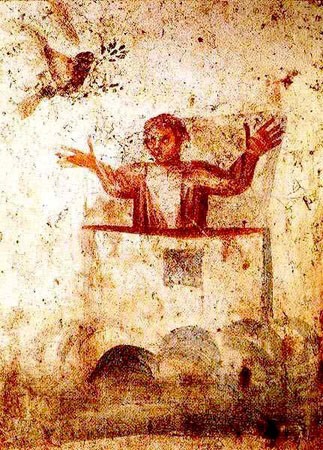February 6thPsalm 134
Take God seriously, but not yourself
What is the chief end of humankind? To glorify God and enjoy Him forever. [Westminster Confession]
Here is the conclusion to the Songs of Ascents. It addresses the gathered congregation and invites them to do what they had come to Jerusalem to do: praise the Lord. The verb ‘bless’ appears three times in these three verses. ‘Blessing’ forms a kind of envelope for the prayer. In vs. 1 the people bless the Lord; in vs. 3 they receive the Lord’s blessing.
1 Come, bless the Lord, all you servants of the Lord,
who stand by night in the house of the Lord!
The prayer is perhaps offered by the pilgrims in an evening service before they depart for home next morning. It begins with an imperative, ‘Come, bless the Lord.’ During this time the pilgrims have been in Jerusalem, they have worshipped enthusiastically. It has been a time of gratitude for all the grace God has given them: safe journeys, family life, a community of care. Worship at the Temple has reminded them of why we are created in the first place, that is, to serve the Lord gratefully and with joy.
2 Lift up your hands to the holy place,
and bless the Lord.
In the Christian catacombs, particularly in Rome, you can often see depictions of figures with their hands raised in prayer, a posture called "orant," which is a common symbol of supplication and devotion, representing the act of prayer with outstretched arms; this is considered one of the most prominent ways early Christians depicted prayer in their art within the catacombs.

One pastor reflects on is lifting up his hands to offer the benediction. ‘I wonder what I’m really doing. Will my congregants’ homes be more full of bounty for this moment? They seem to think so. Heads bow expectantly. I sometimes wonder if this is the whole reason they turn up – to bless the Lord, and now in this final, tender moment, to be blessed by the Lord in return.’ [1]
3 May the Lord, maker of heaven and earth,
bless you from Zion.
We begin by offering blessing to God; now we are blessed by God as we prepare to leave for home and the old routines of life.
It is amazing to think that the Lord blesses the people, the Lord with all the power of one who flung stars into space yet with all the attentive care of one who knows us in every intricate detail. [2]
We are shown here a vulnerable God, a God willing to take a risk with Israel and with us. What promises blessing for God’s people promises suffering for God, for the very people committed to blessing God regularly end up burdening God with their waywardness. The mutuality between God and people means ultimately that God reveals the divine character to be essentially forgiving and steadfastly loving. Such love is our only hope! That is a hope that Christians profess to be sealed in Jesus’ incarnation of God in the form of a servant (Phil. 2.5-11).
This prayer reminds us that we need to take God seriously, but not ourselves. Karl Barth, one of the great theological minds of the 20th century embodies this. His learning was immense as was his work. He wrote a twelve volume, seven-thousand page Church Dogmatics, as well as forty or fifty other books. But underlying it all was a deep cheerfulness grounded in gratitude for being blessed by God. ‘The theologian who has no joy in his work is not a theologian at all,’ he once wrote.
He was on a bus in Basel where he lived and taught. A man came and sat beside him, a tourist. Barth struck up a conversation, ‘You are a visitor, yes? And what do you want to see in our city?’ The man said, ‘I would like to see the great theologian, Karl Barth. Do you know him?’ ‘Oh, yes,’ said Barth, ‘I shave him every morning.’ The man went away satisfied, telling his friends that he had met Karl Barth’s barber! [3]
Take God seriously, but not yourself!
Notes
[1] Jason Byassee – Psalms 101-150 in Brazos Theological Commentary.
[2] The Andromeda Galaxy is a barred spiral galaxy and is the nearest major galaxy to the Milky Way. It was discovered 100 years ago (this January) by Edward Hubble. Since then hundreds of other galaxies have been discovered. We are not alone.
[3] Eugene Peterson – A Long Obedience in the Same Direction.
